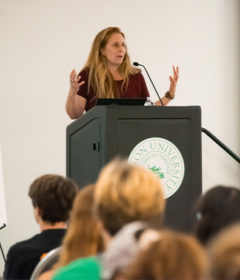Financial Friday: Which Bank is Right for You?


How should I choose a bank, and do I need more than one?
Consumer banks, savings and loans, and credit unions are often lumped together under the term “banks.” All these financial institutions accept consumer deposits and offer some type of checking account, savings account and consumer loans. That doesn’t mean they are all the same, though.
Banks range in size from local to international and some are even available completely online. This type of organization focuses on a broader range of banking services. They may offer large credit cards with reward programs or loans for businesses. Banks may have stock that is traded on a stock exchange and shareholders who demand a profit and dividends on their investment in bank stock.
Savings and loans are more restrictive in the kinds of products they offer and are generally limited to offering checking accounts, savings accounts and loans for auto and home.
Credit unions are more restrictive in their membership and are often targeted at a specific group of employees or people from a limited geographic area.

In choosing an institution (or maybe two), here are some factors to consider:
- What services do you need now? Maybe a checking account, savings account and 1-2 credit cards? Start a list.
- How many loans (and what type of loans) will you need in the next few years? Maybe car, student loans and home mortgage? Add those to the list.
- What institutions are near you? It may be helpful to have a physical bank for your cash needs. It can also be easier to make some deposits, like random birthday checks. Some institutions can even print credit and debit cards at local branches, which can save you time and stress if you lose your card and need a new one.
- What fees do your “banks” charge? Look for no or low-fee accounts. Also consider what they charge you to print checks.
- What interest rates do your “banks” offer on deposits? This is where online banks really shine. Consider adding an online bank if you want a savings account. If you have a physical bank for the checking account, you can make interbank transfers easily as your savings and cash flow needs change.
- What credit card rewards do your cards offer? Look for credit cards with no annual fee, low interest rates and rewards you think that you will really use. The card does not have to come from the same bank where you have an account, but sometimes it is initially easier to get credit that way.
- What are the interest rates on the kinds of loans that you anticipate needing? It’s too early to take out loans that you don’t need yet, but you can get an idea whether your institution is competitive. This is important now, because, when you ask for a loan, you want to be approved. Starting out, one of the factors that your bank may consider is how long you’ve had an account with them.
- What online services are available? Do they offer online bill pay or a mobile application that would make it easier to manage your money? Some institution’s apps even allow for mobile check deposits, saving you a trip out just to cash that $20 check from grandma.
You may ultimately end up with a checking account with a bank, savings at a credit union or savings and loan or online, and a credit card with a major bank. The key is to make an informed choice tailored to your specific needs.
Valrie Chambers, Ph.D., is Chair of the Accounting Department and associate professor of taxation and accounting. Betty Thorne, Ph.D., is a professor of statistics and the Christian R. Lindback Chair of Business Administration. They write Financial Fridays to bolster students’ financial wellness, including preventing financial mistakes, safeguarding their assets and identity, and thinking critically about financial decisions. For questions, contact Valrie Chambers at [email protected].



